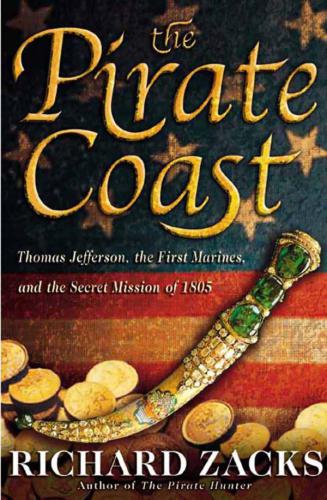
The Pirate Coast
Thomas Jefferson, the First Marines, and the Secret Mission of 1805
کتاب های مرتبط
- اطلاعات
- نقد و بررسی
- دیدگاه کاربران
نقد و بررسی

May 9, 2005
The author of The Pirate Hunter
,
which made Captain Kidd come to life, focuses here more broadly on a piracy hot spot. Resolved to stop the enslavement of American merchant sailors by North African nations, Jefferson deployed most of the infant U.S. Navy to the Mediterranean and sent a column of troops overland from Egypt to place the pasha of Tripoli's brother Hamet on the throne in 1801. The leader of that motley array of mercenaries, Muslim tribesmen, Hamet's retainers and a handful of U.S. Marines was the colorful and combative William Eaton, who led them more than 500 miles across the desert to "the shores of Tripoli." By the time he arrived, peace negotiations were underway, in the hands of one Tobias Deane, who was neither honest nor competent. Eaton had to abandon Hamet and was in turn virtually abandoned by the Jefferson administration, leaving him with a mountain of debt and a drinking problem that eventually killed him at 47. There has been a dearth of good material on the Barbary War and particularly on Eaton's trek; Zacks has researched thoroughly, writes entertainingly and shows a knack for sea stories and characterization. This is the book that Captain Eaton has long deserved.

August 15, 2005
Freelance writer Zacks (The Pirate Hunter) has written an exceptional book about pirates, covert missions, and governmental denial, all during the initial U.S. involvement with North Africa's Muslim city-states. The focus is on the long-forgotten William Eaton, dispatched by Jefferson to lead a column of troops, including eight U.S. marines, overland from Egypt to Tripoli to overthrow the Bashaw, or Pasha. Eaton didn't quite make it to "the shores of Tripoli," which have since been immortalized by the Marine hymn, because Jefferson had also certified diplomatic peace negotiations that trumped the invasion. An exciting, informative book.
Copyright 2005 Library Journal, LLC Used with permission.

June 1, 2005
The term " covert" " operations "is" "usually associated with CIA activities during the cold war. In fact, the U.S. has long used unorthodox secret means to intervene in the affairs of foreign governments to achieve policy goals. In the first decade of the nineteenth century, the Barbary States of North Africa were sponsors of terrorism. Under their tutelage, Islamic corsairs attacked American and European ships and enslaved their crews. When 307 Americans were captured and held for ransom in Tripoli, President Thomas Jefferson authorized a secret mission to effect "regime change" in Tripoli and free the sailors. Zacks, a freelance journalist, recounts the story of that mission with the verve and suspense of an espionage thriller. At the center of the drama is William Eaton, a disgraced diplomat who fanatically pursues his objective, despite lukewarm support from the Jefferson administration. This exciting tale of an obscure but resounding victory against a brutal, lawless cabal provides real-life thrills, including forced desert marches, byzantine plot twists and turns, and heroic triumph against long odds.(Reprinted with permission of Booklist, copyright 2005, American Library Association.)

























دیدگاه کاربران